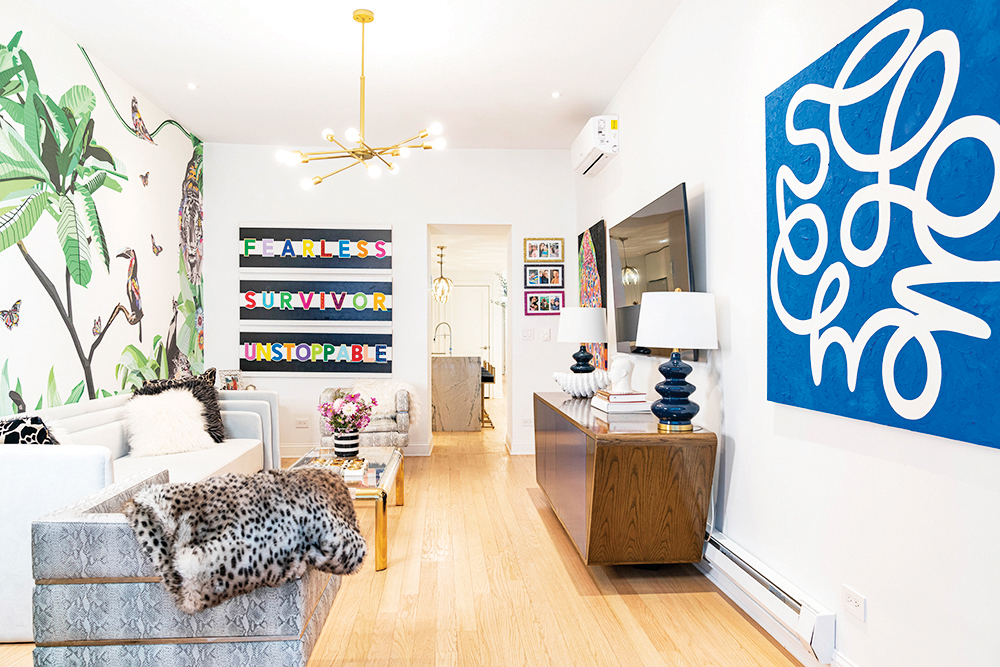
Elizabeth Sutton, an artist with top retail, celebrity and corporate clients, and close ties to Israel, jumped in to help heal the gaping wounds in the psyches of Israeli soldiers, survivors and displaced families after October 7. She went to the country for a volunteer mission she led, where she raised money, donated art, used art as a form of therapy with traumatized people and raised the morale of soldiers by hosting barbecues for the troops. For this, she is being vilified on social media, and dropped by business partners.
Instead of stepping back, Sutton is going all in on using her art to help Israel in a very out front and outspoken way. And she’s at peace with her decision. “Your parnasa comes from God, not retailers,” she said in an interview at her Chelsea gallery. “I’m going to continue my advocacy. If I get dropped, God’s going to bring me parnasa. I’m going to stay aligned with myself and I feel very proud that I made that decision.”
This is not Sutton’s first go around with hard times. In her mid 20s, she went through a divorce with a 3 week old and 2 year old, but that led to her discovering her talent for art and starting a new career. One night, after a fabulous birthday celebration, she lent her car to her art assistants and best friends and one was killed in an accident. Once again, she had to relearn how to embrace life.
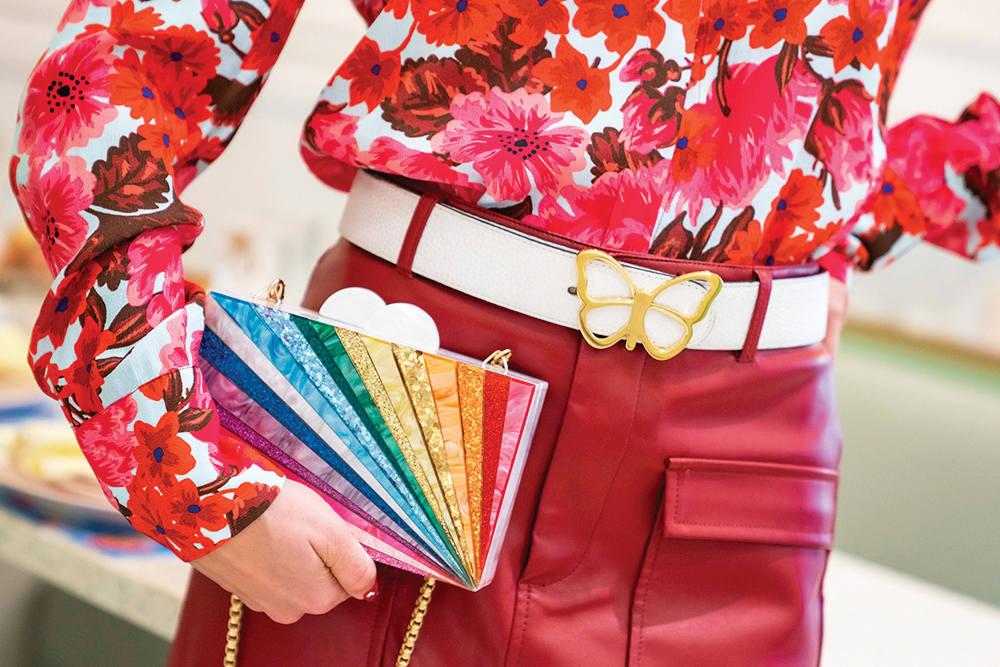
On the day I visited, Sutton’s gallery was brimming with fashion accessories, paintings and posters. Small clutch bags with whimsical patterns, the kind carried by A-list celebrities, adorn the shelves, along with belts, hand made in Mexico. Some of the paintings on the wall were commissioned and will soon be going to their new homes. Assistants and interns were helping with works in progress. Butterflies, a signature design element for Sutton, were scattered on a table, in multiple colors.
The art wakes you up as soon as you enter the gallery—colorful bold patterns, scenes and portraits that insist on being noticed. There are samples of designs for wallpaper and tiles. Some of the interns are sitting around a large desk. Upon closer inspection, you see it’s not an actual desk but a $100,000 billiards table, with the sides and legs painted in bright stripes that took the artist and her team over 1,000 hours of hand labor to complete.
The gallery is humming but at a quieter level than pre-October 7, when Sutton was busy with multiple licensing deals for retail products. Many of those projects have been canceled. Some of the big corporations who hung her paintings in their lobbies and stores have pulled back. It hurts.
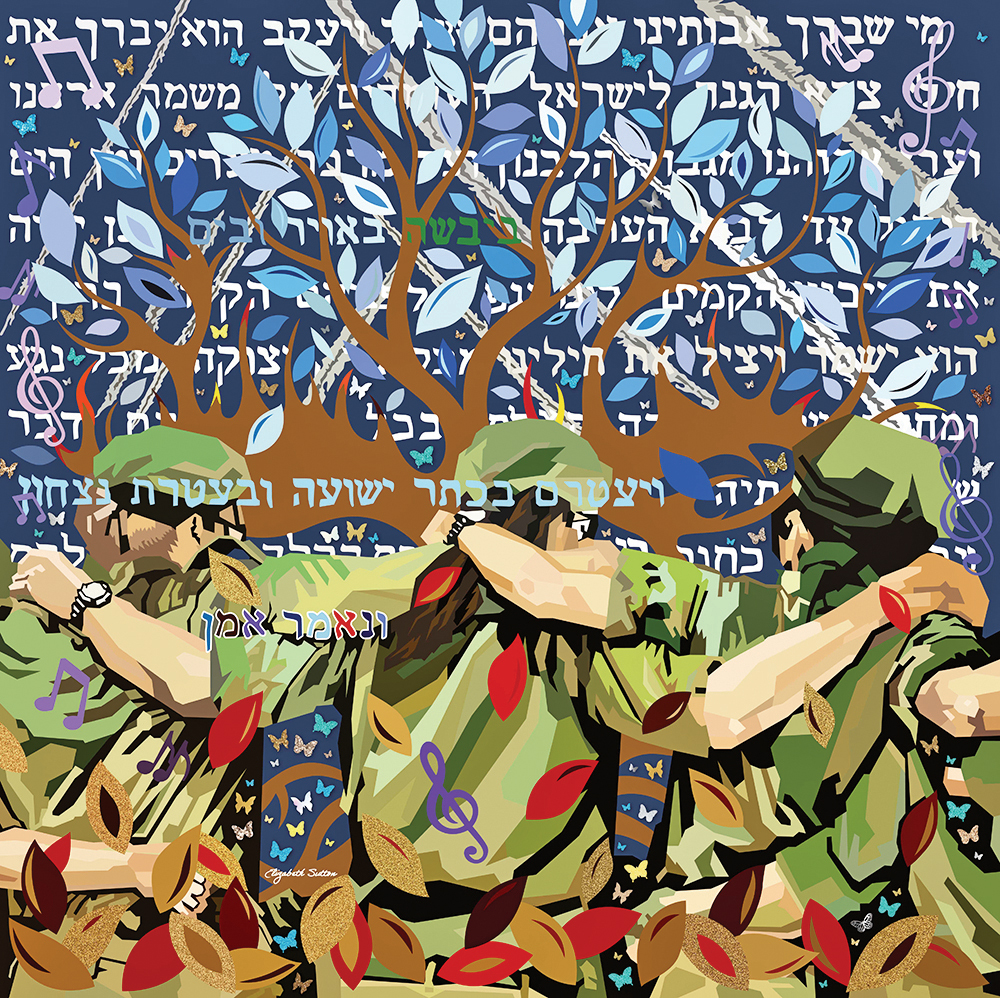
“I lost all my deals, 10 out of 12 corporate contracts,” she said. “Even companies that I know support Israel. They still dropped me. We’re talking four to six months of continued conversations.
We were going forward with deals. They completely ghosted me. Some gave me excuses like ‘budget cuts.’ Some outright told me ‘we have to terminate because of your social media. Retailers won’t touch your brand.’ They had looked at my brand before and loved my brand and what it stood for. Now they look at it and they won’t touch it. It’s written in the emails.”
Social media platforms are more than pretty pictures and ads to scroll past; they are digital shopping venues. When a site is hit with multiple negative posts, it is suspended until the allegations are reviewed, a practice known as shadow banning. That happened to Sutton many times following October 7, including just before Black Friday, the most important retail week of the calendar year. Unable to post and promote her sale, Sutton lost tens of thousands of dollars in sales from Instagram until her page was returned. Loss of business is just one problem. Nasty comments attacking her show up on other feeds. Retailers yanked their support for her as their own pages were infected with negative comments about Sutton.
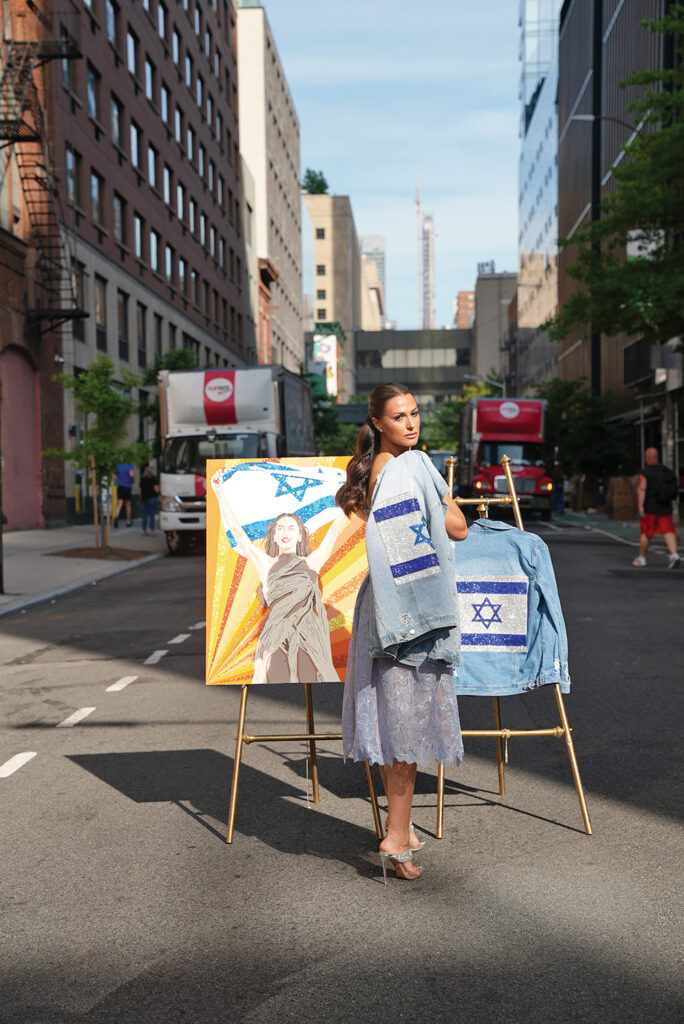
Some retailers offered to market Sutton’s new collections if they weren’t under her name. She almost agreed. “I spent two days fervently rebranding my entire collection. And then that Sunday night I decided I’m a person of character and integrity and I am not going to hide who I am.”
One pivot Sutton is making is to embrace her identity by creating more Jewish art and doing more business with the Jewish community. She made a three-part “Jewish Pride Series” that she calls the best paintings she’s ever created.
An honor and true labor of love was a painting she was commissioned to make as a gift for Eden Golan, the recipient of the Hero award, at the United Hatzalah NYC gala on June 4. Golan is a young Israeli singer who represented her country at the Eurovision Music Awards while facing protests. The only creative direction given to Sutton was to represent Golan’s strength and what the award symbolized. That was easy. “She has a lot of courage for a young woman and she’s so beyond talented,” Sutton said. “The way she handled herself in the face of adversity was really inspiring and I wanted to capture that moment.” Sutton painted Golan holding the Israeli flag, with the United Hatzalah logo in the bottom corner and the word ‘hero’ above. “I wanted it to be very special and glam. I put a lot of gold leaf and all these different textures of glitter. Their (United Hatzalah’s) color is orange so I did a burst in the background in different oranges, tones and glitters. I also made her a customized, crystallized Israeli flag jacket; that for me was the highlight.”
This is the second painting Sutton has made for United Hatzalah. She has been a member of United Hatzalah’s young leadership for almost seven years. She previously arranged to have a United Hatzalah ambucycle brought to the Kotel which she photographed, and then turned the photo into a painting. The original painting was auctioned off for $36,000 and United Hatzalah uses the photo in publicity materials.
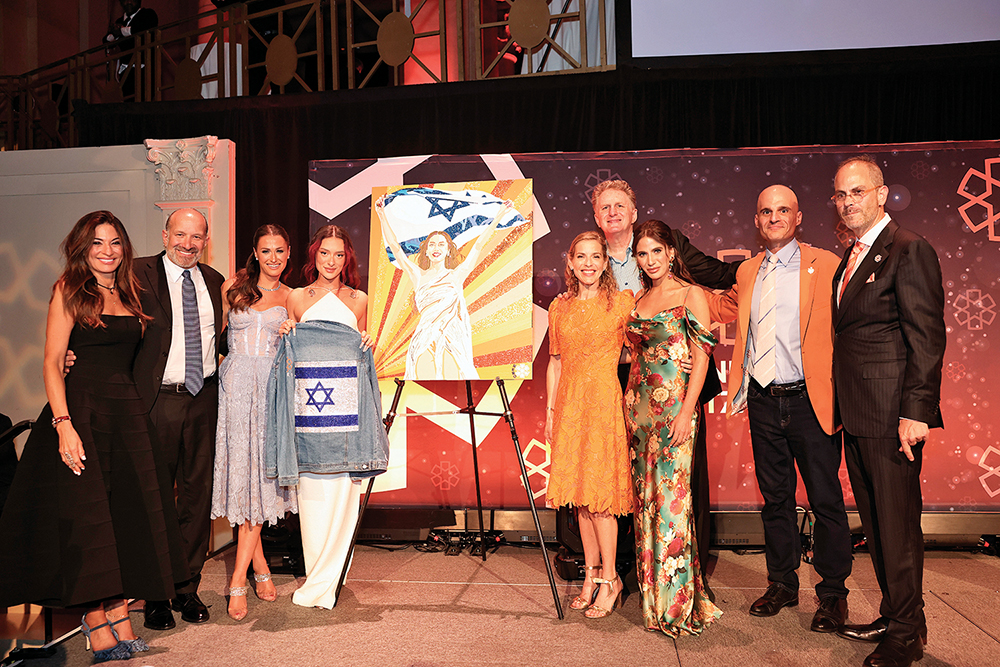
Elizabeth Sutton and Israel go way back. Her great grandparents, Rabbi Emmanuel and Ruth Rackman, were leaders of the Modern Orthodox community in New York and Israel. Rabbi Rackman was president of the Rabbinical Council of America, the chancellor emeritus of Yeshiva University, and the president of Bar Ilan University for a decade. The Rackman Center and the law school at Bar Ilan are named in his honor for his dedication to women’s rights. Sutton spent all her childhood summers in Israel and has many of her best friends there. She grew up in Brooklyn, where she attended the Yeshiva of Flatbush.
One week before October 7, Sutton was in Mykonos, celebrating the wedding of one of her closest Israeli friends, with 150 other Israelis. Exactly one week after the wedding, at 2 a.m., the Israeli group chat that was typically riddled with funny memes went off, with a message that read “terrible morning, stay safe guys.” She spent the next week in a daze, posting information, and realized that her posts had to stop being so negative so as not to affect her brand—which is built on positivity and happiness. The first inkling she had that her world had changed was when four of her college interns quit, with one telling her advisor that Sutton was a racist and her brand conflicted with the intern’s values. That was a shock for Sutton, who had made a painting of George Floyd after he was killed, and thought of herself as someone who was open-minded and loving of all.
She turned to art to come to grips with her feelings about what was happening in Israel. “Etz Ha’Chaim is Reborn,” the first of her Jewish pride series, shows three IDF soldiers and the tree of life with the base on fire. The top of the tree has blue leaves, aggregated to symbolize Jews coming together as a worldwide Jewish community. The leaves at the bottom commemorate loss. There are red leaves for blood and gold leaves to memorialize the lost lives. The background is the prayer that she says every week for the soldiers.
For three months, Sutton focused her work exclusively on planning and leading her own volunteer mission to Israel. She organized art therapy sessions with wounded soldiers, at-risk youth and evacuees, first responders, hostage families and Nova survivors. She did art therapy exercises at Tel Hashomer, and gave away 500 prints and 150 embroidered kippot, as well as left a lasting piece of art as a mural in Tel Aviv. She hosted a large barbecue for soldiers at the Gaza border and created prints for them. She went to the Nova site with a friend who has a brother who was kidnapped to Gaza. She met Yossi Landau, the head of ZAKA there, and gave him the coloring book she developed to help survivors and soldiers process their feelings, which he found helpful. ZAKA collects the human remains from terrorist attacks and the experience in the Gaza border communities was extremely traumatizing. Landau has become a friend and has visited Sutton in her New York gallery. Sutton also did some coincidental kiruv work. She brought a friend, her roommate from when she was a student at NYU, to the party she threw for soldiers. Despite being the granddaughter of two Holocaust survivors, her friend was a non-affiliated Jew. Since the trip with Sutton, she has been more in touch with her Judaism than ever before, doing lots of chesed activities, and returning to Israel two more times since.
After returning from Israel, Sutton held seven fundraisers at her gallery, raising over $250,000, and held a shopping bazaar for the Israeli Children’s Fund. “I am someone who sees the beauty in life, not the negativity,” said Sutton. “So I’m trying to focus my advocacy on the beauty.” Her company has personally donated over $60,000 towards Israel initiatives since the war broke out—”You can’t expect to receive if you don’t give,” she said. Art, business and tzedakah are all wrapped together for Sutton. She found new buyers for her art in Israel. When she makes a sale, she donates a percentage to non-profits so she is able to do more for groups like United Hatzalah, ZAKA, IDF, Magen Dovid Adom, Leket, AJC, army units and individuals who need help. She now has relationships with some printers there so she feels she’s contributing to the economy.
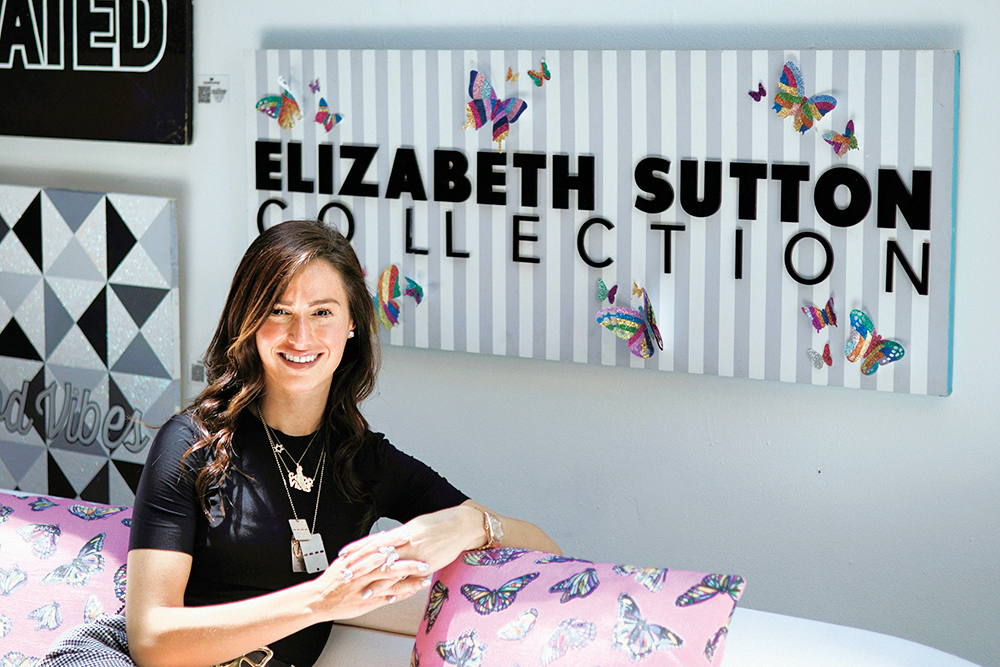
Sutton’s art in the commercial and secular world continues. She has college interns again, several who are Jewish, and others who know who she is, and know her values align with theirs.
She is still commissioned by high-net-worth individuals to create paintings—commissions are 90% of her business—and her clutches, belts and jewelry are available online. Additionally, she has award winning tile collections for Tilebar and a beautiful array of customizable wallpapers. She is coming out with a line of more affordably priced table accessories that people can buy for themselves or as hostess gifts. You can find all her fashion, art and home goods products at www.elizabethsuttoncollection.com and at instagram.com/elizabethsuttoncollection.
Sutton knows that while she is doing her part to keep her business strong, she’s not in charge. No person is. “Keep a positive mindset. Look at the beauty of what’s going on. Look at all the philanthropy the community is doing, the creativity that’s coming out of Jewish artists and musicians, the strength of the IDF, and the unity that is happening. And understand that this is all part of God’s plan. Once you learn to accept that, you’ll be able to approach what’s happening much better.”
Bracha Schwartz is the special sections editor at The Jewish Link.









